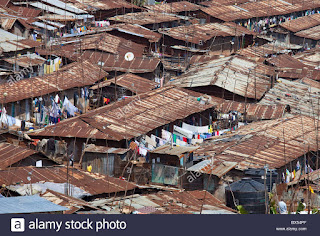Kibera. The largest urban slum in Africa located only a 21 minute drive from Nairobi's City Center. This slum has 250,000 people living in it, which accounts for about 12.5% of Nairobi’s population. The history of this over-crowded slum is more interesting than that of most parts of Nairobi, to my consideration. It goes as follows:
The land Kibera is currently on started developing in 1904 when the British government allocated the land to the Nubians who fought in Britain’s war. The land was considered valuable since it was close to the city center. The location was significant because during colonization only Europeans were permitted to live within the city boundaries. All other native Africans had to live on native reserves outside of the city. To capitalize on the land that they owned, the Nubians rented out and eventually sold their land to other people, who then settled there. More and more people came there, until it became what we now call Kibera.
Currently, the Kenyan government has claimed ownership of the land in which Kibera sits on. Funded by the World Bank, the government has launched KENSUP, which stands for Kenyan Slum Upgrading Project. Their main focus right now is to move the residents of Kibera into concrete apartment buildings at subsidized rates. These apartment buildings have running water and electricity, which are commodities very few Kibera residents have access to. However, this plan is not working well, the primary reasons being that the apartments cost more than the shacks that they are used to living in, and that they don’t want to leave their community.
We think that the reason that the Kenyan government is stepping in and attempting to relocate Kibera is because of its location. Real estate prices in downtown Nairobi have soared, and Kibera is taking up a lot of valuable land. The issue's complexity grows as the middle class of Nairobi is struggling to pay the rent needed to live in close proximity to the city, so they are attempting to get apartments in the buildings intended for Kibera residents. They might bribe city officials to give them an apartment, or they might pay the residents directly. Some residents charge them 3-4 times what they’re paying, so that they can return to Kibera with money in their pocket. This is a complicated issue, and it is very difficult to deal with. Researching this has increased my compassion for the many whose struggle is daily and more challenging than I can ever imagine. 
~Kyle Wilson


No comments:
Post a Comment